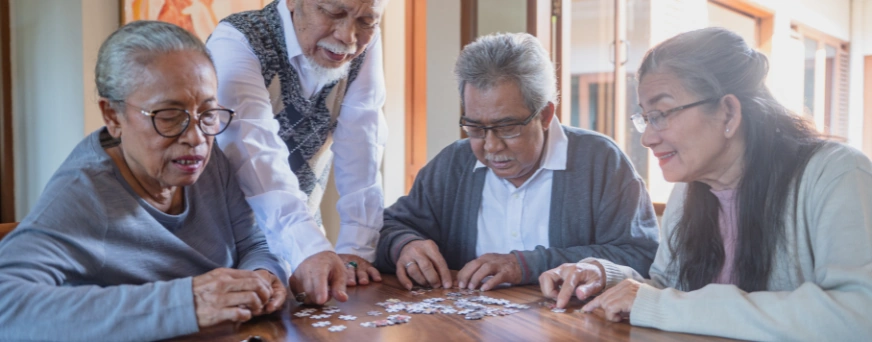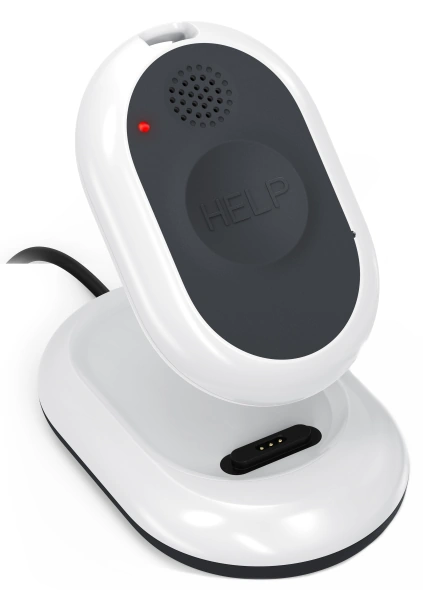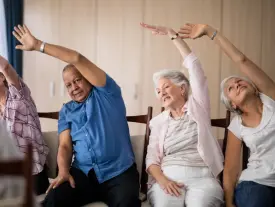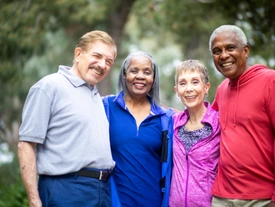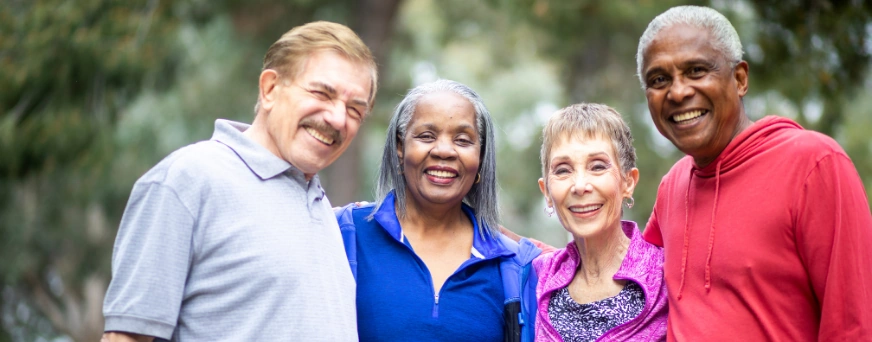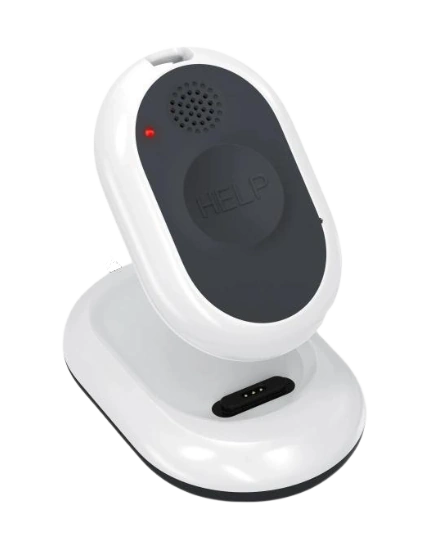Top 5 Memory Games For Seniors To Improve Memory Retention
Key Takeaway
Memory games like matching pairs, “I Spy,” life-story timelines, word association, and Simon Says help seniors sharpen recall, attention, and problem-solving skills. Regular play of these fun, adaptable games supports cognitive health and greater social engagement.
The older a person is, the more important it becomes to keep sharp. Memory games for seniors are an amusing way to keep the brain working and engaged, with the added advantage of boosting memory.
By incorporating these memory games into daily routines, individuals can enjoy better cognitive health and a much more active and full lifestyle.
We will focus on five top memory games targeted toward seniors in the United States, bringing into play considerations for accessibility and enjoyment.
The Importance of Maintaining Brain Power as We Age
As we age, maintaining brain power and cognitive health becomes increasingly important. Cognitive decline is a natural part of aging, but engaging in activities that challenge the brain can help slow down or even prevent memory loss and cognitive decline.
Brain exercises, such as memory games, not only improve memory retention but also support other cognitive abilities, like attention, problem-solving, and verbal skills. Maintaining brain power helps seniors stay independent, enhance their quality of life, and avoid the early onset of conditions like dementia or Alzheimer's disease.
Additionally, keeping the brain engaged fosters mental clarity, improves mood, and boosts overall well-being. Just like physical exercise is vital for bodily health, mental exercise is essential for cognitive longevity.
Top 5 Memory Games for Seniors

These are super fun memory games for the older population:
The Classic: Matching Pairs
Matching Pairs is an immortal game that really trains the memory retention of the elderly. Players flip cards face up one at a time and try to find matching pairs.
Actually, the real challenge of the game comes through the memorization of where cards have been flipped to, thus exercising visual memory and short-term recall.
The game may be played by the elderly using an average pack of cards or with specially made memory cards having large pictures and clear symbols so they can be recognized more easily.
One of the strong points of Matching Pairs is its versatility for seniors with different cognitive abilities.
It can also be made more challenging to suit the elders by flipping three or four cards at a time, which will raise the difficulty level of the exercise on the brain and thereby require much concentration and memory retention.
This adaptability helps ensure that seniors who would like to train their brains even further can still enjoy the game.
I Spy: A Sensory Adventure
I Spy, a cherished childhood game, can be especially enriching for seniors. In this version, one player selects an object in the room and describes it using sensory details like color, texture, or sound.
Other players then guess what the object is, which helps stimulate memory and descriptive language skills.
The game challenges players' visual and auditory memory as they recall sensory details based on the clues given. Its adaptability is one of its key strengths; you can adjust the difficulty by choosing either obvious or more obscure objects based on the players' abilities.
For seniors, this means the game can be tailored to their cognitive levels, ensuring it remains engaging without being overly challenging.
Additionally, I Spy promotes social interaction and communication. As players describe objects and guess based on sensory details, they practice descriptive language and verbal skills.
This not only provides mental stimulation but also fosters meaningful connections, making it a delightful and beneficial activity for seniors to enjoy together.
Let’s Reminisce: The Life Story Timeline
The Life Story Timeline is a deeply engaging activity for seniors, much beyond the scope of simple memory games. Individuals create chronological documentation of life events, people, and places through photos, mementos, or just conversation.
It requires very minimal materials and can be adapted to the needs of clients: photos may be replaced by written descriptions, and participation may be verbal or written.
A Life Story Timeline aids in facilitating long-term memory and affective recall, thereby serving cognitive health. By recalling major life events, seniors mentally exercise memory and think back on their life journey and related changes.
One of the chief strengths of the Life Story Timeline is the fact that it can be adapted. It should be attuned to the participant's cognitive capacity, whether one uses visual means or simply tells stories verbally.
In this way, the activity can be made accessible and enjoyable for seniors with varying levels of cognitive function.
This activity also allows for social bonding. When done with family or friends, it brings out some useful conversation regarding what has happened in the past, therefore giving a feeling of history and bond that confirms those friendships.
The Name Game: A Word Association Twist
This is a very enjoyable and flexible memory activity for seniors. It works on a format similar to the classic "Name a celebrity whose name begins with the last letter of the previous one," such that players take turns naming things within a chosen category, from animals to food to cities. Simple setup allows it to be suitable for different levels of vocabulary and cognitive skill.
In the Name Game, one has to recall previous words and also think of new words that will fit the category. That keeps short-term memory sharp, but it's also going to do what's known as keeping cognitive agility sharp.
Now, placing a time limit or even changing categories will add another level of challenge to the mental action involved in flexibility.
The Name Game promotes social interaction, boosting communication skills, for the players need to actively listen and verbally express one after the other.
It represents mental stimulation by way of talking with others, creating meaningful conversations and connections—what could be a great activity for seniors.
Simon Says: Following Instructions with a Twist
This memory-twist version of Simon Says is an excellent game that puts seniors in a light, playful challenge. One player assumes the role of Simon, who gives a number of commands in a single breath, which includes actions.
Players must do the instructions if, and only if, "Simon Says" comes before the command. Instructions can be as complicated or as simple as the players' capabilities demand, making it accessible to everyone.
This game sharpens one's attention, memory, and coordination since one has to listen carefully and then differentiate between the valid and invalid commands. It adds a little fun and unpredictability with the "Simon Says" twist.
One of the biggest strengths of Simon Says is its flexibility. Instructions could be very simple, like "touch your nose" for complete beginners, or a little bit complex, such as "clap your hands twice if you like pizza."
It is this easiness in instructions that enables the game to be accessible for seniors at different cognitive levels.
Moreover, Simon Says enhances socialization and pleasure. It is a fun activity in which the game players undergo a process of directives, making it enjoyable and also fostering bonding during social functions and family affairs.
The Scientific Backing of Brain Games
Studies and experts have long emphasized the role of brain games in maintaining and improving cognitive health. Research has shown that engaging in mental exercises—like puzzles and games—can boost memory, improve focus, and delay cognitive decline.
For example, a study published by the American Journal of Geriatric Psychiatry demonstrated that seniors who engaged in cognitive training exercises showed improvement in short-term memory, processing speed, and other cognitive functions. Experts agree that mental stimulation, when paired with a healthy lifestyle, can help prevent age-related conditions such as dementia and Alzheimer’s.
By consistently engaging in brain games, seniors can create new neural pathways, which enhances cognitive flexibility and boosts long-term memory retention.
Complementary Activities for Cognitive Health
In addition to memory games, there are various other activities that can complement brain exercises and promote overall cognitive health. These include:
-
Crossword puzzles: These are a great way to challenge memory and expand vocabulary.
-
Sudoku: This number-based puzzle helps improve logical thinking and concentration.
-
Mental math exercises: Counting backwards or solving math problems is a great way to keep the brain sharp.
-
3D video games: Games that involve spatial reasoning and navigation are particularly effective in stimulating cognitive functions.
The Benefits of Combining Physical and Mental Exercises

Incorporating physical exercise alongside mental workouts offers a more holistic approach to cognitive health. Activities like Tai Chi, yoga, and even simple walking routines are excellent ways to enhance brain function. These physical exercises improve circulation, reduce stress, and enhance overall brain function, while also promoting physical health.
Additionally, a study published in The Journals of Gerontology found that combining physical and cognitive exercises significantly improved cognitive function, memory, and mood in seniors.
Computerized Brain Training Games
For those who are comfortable with technology, computerized brain training games can be a great tool for cognitive improvement. These digital platforms offer interactive exercises that focus on memory, problem-solving, and attention. Many of these platforms are designed specifically for seniors, offering tailored exercises based on cognitive level and progress tracking to monitor improvements over time.
Conclusion
These five memory games for seniors offer a lovely way to keep seniors’ minds sharp and busy. They provide variations in difficulty that will help retain memory, encourage socialization, and support all-around cognitive health. By incorporating these activities into daily routines, seniors can boost their cognitive functions while enjoying meaningful interactions with loved ones.

